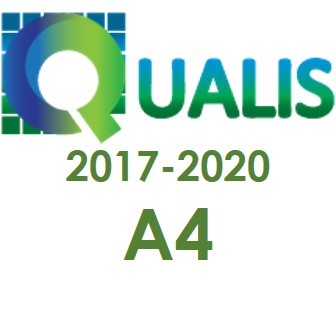Os jogos no desenvolvimento de habilidades sociais em crianças com autismo
uma revisão integrativa
Palavras-chave:
Transtorno do Espectro Autista. Jogos experimentais. Habilidades sociais.Resumo
Conforme o Ministério da Educação, atualmente, há um aumento significativo de casos de Transtorno do Espectro Autista (TEA) em crianças, sendo fundamental novas intervenções para essa população. Objetivou-se realizar uma revisão integrativa de literatura, incluindo apenas ensaios clínicos que abordassem os efeitos dos jogos no desenvolvimento de habilidades sociais em crianças com TEA. Um estudo apontou benefícios em jogo específico. Embora outros trabalhos não tenham relatado diferenças relevantes entre os grupos intervenção e controle, obtiveram melhoras nas avaliações pós-jogo. Portanto, não se pode afirmar que os jogos têm potencial para beneficiar crianças autistas, constituindo-se como uma lacuna de conhecimentos que carecem de novos ensaios clínicos.
Downloads
Referências
ALMEIDA, M. L.; NEVES, A. S. A popularização diagnóstica do autismo: uma falsa epidemia? Psicologia: Ciência e Profissão, v. 40, e180896, nov. 2020. DOI: https://doi.org/10.1590/1982-3703003180896
BEAUMONT, R. et al. Randomized Controlled Trial of a Video Gaming-Based Social Skills Program for Children on the Autism Spectrum. Journal of Autism and Developmental Disorders, v. 51, n. 10, p. 3637-3650, out. 2021. DOI: https://doi.org/10.1007/s10803-020-04801-z
BOYD, B. A. et al. Efficacy of the ASAP Intervention for Preschoolers with ASD: A Cluster Randomized Controlled Trial. Journal of Autism and Developmental Disorders, v. 48, n. 9, p. 3144-3162, set. 2018. DOI: https://doi.org/10.1007/s10803-018-3584-z
BRASIL. MINISTÉRIO DA EDUCAÇÃO. Censo Escolar. Disponível em: https://www.gov.br/inep/pt-br/areas-de-atuacao/pesquisas-estatisticas-e-indicadores/censo-escolar/resultados. Acesso em: 09 nov. 2023.
BRITO, L. F. et al. Nutrikids: jogo sério para o desenvolvimento do conhecimento nutricional em crianças e adolescentes. RELATEC, v. 19, n. 1, p. 93-106, 3 jul. 2020. DOI: https://doi.org/10.17398/1695-288X.19.1.93
CARVALHO, A. P. V.; SILVA, V.; GRANDE, A. J. Avaliação do risco de viés de ensaios clínicos randomizados pela ferramenta da colaboração Cochrane. Diagnóstico e tratamento, v. 18, n. 1, p. 38-44, 2013. Disponível em: http://files.bvs.br/upload/S/1413-9979/2013/v18n1/a3444.pdf. Acesso em: 6 abr. 2023.
DEAN, M. et al. The peer relationships of girls with ASD at school: comparison to boys and girls with and without ASD. Journal of Child Psychology and Psychiatry, and Allied Disciplines, v. 55, n. 11, p. 1218-1225, nov. 2014. DOI: https://doi.org/10.1111/jcpp.12242
DIAS, J. D. et al. Use of serious games for coping with childhood obesity: integrative literature review. Texto & Contexto - Enfermagem, v. 26, n. 1, 3e3010015, 2017. DOI: https://doi.org/10.1590/0104-07072017003010015
DOWNLOAD AND INSTALLATION REVMAN 5. [S.d.]. Disponível em: https://training.cochrane.org/online-learning/core-software-cochrane-reviews/revman/revman-5-download/download-and-installation. Acesso em: 8 abr. 2023.
FERNÁNDEZ, M.; MOLLINEDO-GAJATE, I.; PEÑAGARIKANO, O. Neural Circuits for Social Cognition: Implications for Autism. Neuroscience, v. 370, p. 148-162, 1 fev. 2018. DOI: https://doi.org/10.1016/j.neuroscience.2017.07.013
FLETCHER-WATSON, S. et al. A trial of an iPadTM intervention targeting social communication skills in children with autism. Autism: The International Journal of Research and Practice, v. 20, n. 7, p. 771-782, out. 2016. DOI: https://doi.org/10.1177/1362361315605624
FRYE, R. E. Social Skills Deficits in Autism Spectrum Disorder: Potential Biological Origins and Progress in Developing Therapeutic Agents. CNS Drugs, v. 32, n. 8, p. 713-734, 2018. DOI: https://doi.org/10.1007/s40263-018-0556-y
GIL, A. C. Como elaborar projetos de pesquisa. 4 ed. São Paulo: Atlas, 2002. Disponível em: https://docente.ifrn.edu.br/mauriciofacanha/ensino-superior/redacao-cientifica/livros/gil-a.-c.-como-elaborar-projetos-de-pesquisa.-sao-paulo-atlas-2002./view Acesso em: 15 de jun. 2023.
GOLAN, O. et al. Enhancing emotion recognition in children with autism spectrum conditions: an intervention using animated vehicles with real emotional faces. Journal of Autism and Developmental Disorders, v. 40, n. 3, p. 269-279, mar. 2010. DOI: https://doi.org/10.1007/s10803-009-0862-9
GROSSARD, C. et al. Serious games to teach social interactions and emotions to individuals with Autism Spectrum Disorders (ASD). Computers & Education, v. 113, p. 195-211, 1 out. 2017. DOI: https://doi.org/10.1016/j.compedu.2017.05.002
GRYNSZPAN, O. et al. Innovative technology-based interventions for Autism Spectrum Disorders: a meta-analysis. Autism: The International Journal of Research and Practice, v. 18, n. 4, p. 346-361, maio 2014. DOI: https://doi.org/10.1177/1362361313476767
HEALY, S. et al. Physical Activity, Screen-Time Behavior, and Obesity Among 13-Year Olds in Ireland with and without Autism Spectrum Disorder. Journal of Autism and Developmental Disorders, v. 47, n. 1, p. 49-57, jan. 2017. DOI: https://doi.org/10.1007/s10803-016-2920-4
HIGGINS, J. et al. Cochrane Handbook for Systematic Reviews of Interventions. 2022. Disponível em: https://training.cochrane.org/handbook/current. Acesso em: 6 abr. 2023.
HULLEY, S. B. et al. Delineando a pesquisa clínica. 4. ed. Porto Alegre: Artmed, 2015.
JOUEN, A.-L. et al. GOLIAH (Gaming Open Library for Intervention in Autism at Home): a 6-month single blind matched controlled exploratory study. Child and Adolescent Psychiatry and Mental Health, v. 11, n. 1, p. 1-14, dez. 2017. DOI: https://doi.org/10.1186/s13034-017-0154-7
MAZUREK, M. O.; WENSTRUP, C. Television, video game and social media use among children with ASD and typically developing siblings. Journal of Autism and Developmental Disorders, v. 43, n. 6, p. 1258-1271, jun. 2013. DOI: https://doi.org/10.1007/s10803-012-1659-9
MENDES, K. D. S.; SILVEIRA, R. C. DE C. P.; GALVÃO, C. M.. Revisão integrativa: método de pesquisa para a incorporação de evidências na saúde e na enfermagem. Texto & Contexto - Enfermagem, v. 17, n. 4, p. 758–764, out. 2008. DOI: https://doi.org/10.1590/S0104-07072008000400018
MURTA, S. G. Aplicações do treinamento em habilidades sociais: análise da produção nacional. Psicologia: Reflexão e Crítica, v. 18, p. 283-291, ago. 2005. DOI: https://doi.org/10.1590/S0102-79722005000200017
ROCHA, C. C. et al. O perfil da população infantil com suspeita de diagnóstico de transtorno do espectro autista atendida por um Centro Especializado em Reabilitação de uma cidade do Sul do Brasil. Physis: Revista De Saúde Coletiva, v. 29, n. 4, e290412, 2019. DOI: https://doi.org/10.1590/S0103-73312019290412
SOUSA, C. A. F.; ARAÚJO, H. J. N.; BARBOSA, M. F. Ensino de habilidades sociais para pessoas com Transtorno do Espectro Autista: uma revisão sistemática. Revista Educação Especial, v. 35, e19/1-16, 28 jun. 2022. DOI: https://doi.org/10.5902/1984686X65428
UNDP. United Nations Development Programme. Human Development Reports 2020: The next frontier. New York: UNDP, 2020. Disponível em: https://hdr.undp.org/system/files/documents/hdr2020pdf.pdf. Acesso em: 10 abr. 2023.
VIGGIANO, A. et al. Kaledo, a board game for nutrition education of children and adolescents at school: cluster randomized controlled trial of healthy lifestyle promotion. European Journal of Pediatrics, v. 174, n. 2, p. 217-228, fev. 2015. DOI: https://doi.org/10.1007/s00431-014-2381-8
Arquivos adicionais
Publicado
Como Citar
Edição
Seção
Licença
Copyright (c) 2023 Revista Brasileira de Iniciação Científica

Este trabalho está licenciado sob uma licença Creative Commons Attribution-NonCommercial-ShareAlike 4.0 International License.




